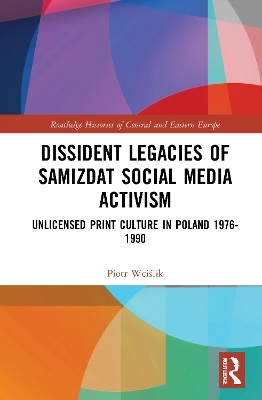
Dissident Legacies of Samizdat Social Media Activism
Routledge (Verlag)
978-0-367-75670-3 (ISBN)
This book tells the story of the dissident imaginary of samizdat activists, the political culture they created, and the pivotal role that culture had in sustaining the resilience of the oppositional movement in Poland between 1976 and 1990.
This unlicensed print culture has been seen as one of the most emblematic social worlds of dissent. Since the Cold War, the audacity of harnessing obsolete print technology known as samizdat to break the modern monopoly of information of the party-state has fascinated many, yet this book looks beyond the Cold War frame to reappraise its historical novelty and significance. What made that culture resilient and rewarding, this book argues, was the correspondence between certain set of ideas and media practices: namely, the form of samizdat social media, which both embodied and projected the prefigurative philosophy of political action, asserting that small forms of collective agency can have a transformative effect on public life here and now, and are uniquely capable of achieving a democratic new beginning.
This prefigurative vision of the transition from communism had a fundamental impact on the broader oppositional movement. Yet, while both the rise of Solidarity and the breakthrough of 1989 seemed to do justice to that vision, both pivotal moments found samizdat social media activists making history that was not to their liking. Back in the day, their estrangement was overshadowed by the main axis of contention between the society and the state. Foregrounding the internal controversies they protagonized, this book adds nuance to our understanding of the broader legacy of dissent and its relevance for the networked protests of today.
Piotr Wciślik is Assistant Professor and Deputy Director of the Digital Humanities Centre at the Institute of Literary Research of the Polish Academy of Sciences. He has published extensively on the history of dissident political thought and dissident media, and is currently developing a data-driven approach in that area.
Introduction: Dissident Imaginaries, Samizdat Social Media, and the Hirschman Question Part 1: Introducing Samizdat Social Media 1. Imaginaries and Practices of Samizdat Social Media 2. The Fate of Free Word Depends on Ourselves. The Origins of Dissident Social Media Activism Part 2: Solidarity Media Matters 3. Democracy as Oversight. The Trade Union and its Press 4. Quis Custodiet Ipsos Custodes? Trade Union Press between Social Media and Surrogate Mass Media 5. Indivisible are the Principles which Orient our Actions. Trade Union Press in Proceedings of Solidarity’s First National Congress Part 3: The Underground Society 6. Dissident Social Media during and after the Martial Law 7. Political Economy of Unlicensed Publishing Part 4: Lost in Transition 8. Crisis and Compromise 9. The Exceptional Moment of Dissident Politics 10. The Margin of Liberty Conclusion
| Erscheinungsdatum | 22.12.2022 |
|---|---|
| Reihe/Serie | Routledge Histories of Central and Eastern Europe |
| Verlagsort | London |
| Sprache | englisch |
| Maße | 156 x 234 mm |
| Gewicht | 204 g |
| Themenwelt | Geschichte ► Allgemeine Geschichte ► Zeitgeschichte |
| Naturwissenschaften ► Geowissenschaften ► Geografie / Kartografie | |
| Sozialwissenschaften ► Politik / Verwaltung ► Politische Systeme | |
| Sozialwissenschaften ► Politik / Verwaltung ► Politische Theorie | |
| ISBN-10 | 0-367-75670-6 / 0367756706 |
| ISBN-13 | 978-0-367-75670-3 / 9780367756703 |
| Zustand | Neuware |
| Informationen gemäß Produktsicherheitsverordnung (GPSR) | |
| Haben Sie eine Frage zum Produkt? |
aus dem Bereich


